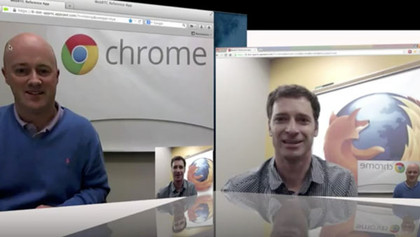WebRTC uncovered: why it's the future of online communications
Move over Skype and FaceTime

The web has revolutionised communication, and WebRTC promises to take the revolution a step further. The free, open-source project enables compliant web browsers to communicate in real-time using simple JavaScript APIs.
The project's mission: "To enable rich, high quality, real-time communication applications to be developed in the browser via simple JavaScript APIs and HTML5." Think Skype or FaceTime, built into the browser—and far more once developers start tinkering.
Distinguished Engineer at Avaya, Inc. Alan Johnston co-wrote a comprehensive book on the technology, and he's truly excited about its potential: "WebRTC is about unleashing the power of real-time communication to any web developer or application. Before WebRTC, to add real-time communication, a developer needed to know protocols and select stacks, often requiring licensing.
Now, WebRTC browsers such as Chrome and Firefox have all this built in, and developers can utilise them with a few simple API calls in their JavaScript." Net benefits, says Johnston, will be lower development costs, richer interaction on websites, and potentially happier end users.

The plug-in free future
A big draw with WebRTC is the manner in which it's baked into browsers. Mobile platforms such as iOS started the drift away from plug-ins, but a future free from them has long been the goal of many web standards advocates.
"Removing boundaries for people to use these technologies is important to ensure uptake, and it alleviates security and privacy fears that come with downloading a third-party plug-in," says Andi Smith, a presentation technical architect at AKQA.
He notes how widespread adoption of WebRTC would eliminate commonplace scenarios where you plan a conference call, only to discover on the day that an attendee lacks the right plug-in or app. "Along with causing fragmentation and being expensive to develop, plug-ins are a major vector for malware," adds Johnston, further cementing why the web would be best rid of them.
Get daily insight, inspiration and deals in your inbox
Sign up for breaking news, reviews, opinion, top tech deals, and more.
Usability, though, is perhaps the most important factor in WebRTC. In providing developers with a relatively simple means of dealing with complex technology, innovation can flourish through utilising WebRTC for new ideas, rather than spending time recreating foundations.
"The technology behind RTCPeerConnection—the WebRTC API for audio and video communication—blows me away. This is an amazing engineering achievement, and it shields developers from a multitude of complex tasks that are really hard to do well but are crucial to real-time communication," says Google Developer Advocate Sam Dutton.
He elaborates: "To mention a few: echo cancellation, packet loss concealment, bandwidth adaptivity, automatic gain control, noise reduction and suppression, image 'cleaning' and the beautifully named 'dynamic jitter buffering', which maintains reserves of data to avoid video hiccups!"
A world beyond Skype
On watching a recent WebRTC demo (below), it's not hard to see how it could rapidly take over from the likes of Skype.
However, beyond such obvious applications, enterprising developers could do far more, according to those already immersed in the technology. "WebRTC has the potential to make the web a more interactive place," argues Smith, who suggests video-based customer service could be directly integrated into websites.
He also reckons we could see web-cams tracking head movement to perform gestures or change font sizes, depending on distance. "Accessibility is definitely an exciting area of WebRTC," agrees Johnston. "We usually think of WebRTC as enabling communication between users on browsers, but it will likely also be used to generate new user interfaces for websites, besides the keyboard, assisting those with disabilities."
Dutton adds that "disruptive technologies transform our lives in unpredictable ways," too, noting that no-one would have predicted Ajax would lead to Google Maps. By way of example, he says Google's I/O developer conference saw Tethr unveiled, a framework for disaster communications that can run off a car battery and fit in a small briefcase: "It uses an OpenBTS mobile cell to enable communications between feature phones and computers via WebRTC. It's telephone communication without a carrier."